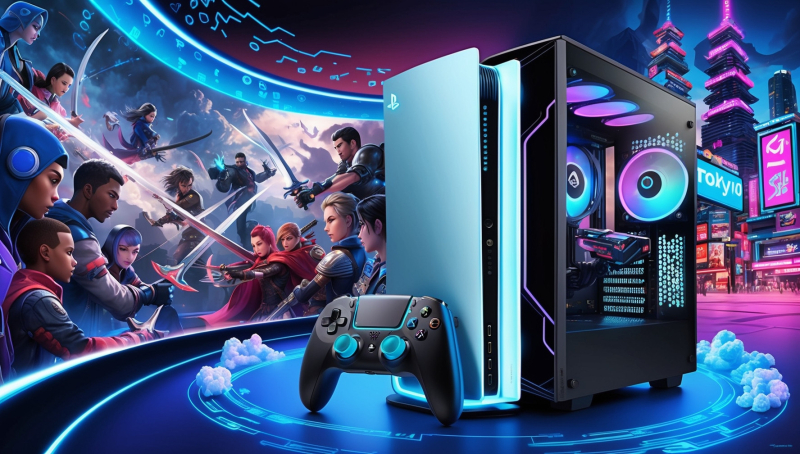The World of Gaming: Comparing Console and PC Platforms
October 22, 2024

In the ever-evolving landscape of digital entertainment, the debate between console and PC gaming platforms has been a long-standing discussion among enthusiasts. Each platform offers its own unique set of advantages and experiences, catering to different types of gamers worldwide. This article delves into various aspects of both platforms, examining what sets them apart and what they bring to the table for players.
The Appeal of Console Simplicity
Consoles have long been celebrated for their straightforward, user-friendly approach to gaming. With plug-and-play functionality, consoles like the PlayStation and Xbox series offer an accessible entry point for gamers of all ages. The standardized hardware ensures that games are optimized for performance, reducing the likelihood of technical issues and compatibility problems.
The Flexibility of PC Gaming
On the other hand, PC gaming is renowned for its flexibility and customization options. Players can tailor their gaming rigs to meet specific performance needs, whether it's achieving higher frame rates or enhanced graphics. The ability to modify hardware components allows for an ever-evolving gaming experience, adapting to the latest technological advancements.
Performance Showdown: Graphics and Processing Power
When it comes to raw performance, PCs often have the upper hand due to the potential for high-end components. Advanced graphics cards and processors enable PCs to deliver superior visual fidelity and smoother gameplay. However, modern consoles have made significant strides, offering 4K resolution and ray tracing capabilities, narrowing the performance gap between the two platforms.
Exclusive Titles and Game Libraries
Game availability is a critical factor for many gamers when choosing a platform. Consoles typically boast exclusive titles that are not available on other systems, attracting fans of specific franchises. PCs, however, offer a vast library of games, including indie titles and classics, thanks to platforms like Steam and GOG. Additionally, many PC games support mods, allowing players to enhance and expand their gaming experience.
Control Schemes: Controllers vs. Keyboard and Mouse
The input methods for consoles and PCs offer different experiences. Consoles primarily use controllers, providing an ergonomic and straightforward interface ideal for casual gaming and certain genres like racing or sports. PCs utilize keyboard and mouse setups, offering precision and customization, which is particularly advantageous in genres like first-person shooters and strategy games.
Online Gaming and Community Engagement
Both platforms offer robust online gaming experiences but differ in their approach. Consoles often require subscription services for online play, which provide additional benefits like free monthly games and exclusive discounts. PC gaming generally allows for free online play, fostering large communities on platforms like Discord and Reddit. This openness facilitates greater community engagement and accessibility.
Customization and Modding Opportunities
One of the standout features of PC gaming is the ability to customize both hardware and software. Players can build their own PCs, selecting components that fit their budget and performance requirements. Moreover, the modding community thrives on PC, with many games supporting user-created content that can significantly alter or enhance the gameplay experience.
Cost Considerations and Value for Money
The initial cost of entry is often lower for consoles, as they are sold as complete packages ready for gaming out of the box. PCs can range from budget-friendly setups to high-end machines costing significantly more. However, PC games often have lower prices and more frequent sales, which can offset the initial investment over time. Additionally, PCs serve multiple functions beyond gaming, potentially offering greater overall value.
Portability and Space Requirements
Consoles are typically compact and designed to fit seamlessly into home entertainment setups. This makes them ideal for living room gaming and shared spaces. PCs, especially gaming rigs, can be bulkier and require dedicated space. While gaming laptops offer portability, they often come at a higher cost for equivalent performance compared to desktops.
Virtual Reality and Emerging Technologies
Emerging technologies like virtual reality (VR) have different levels of support on consoles and PCs. PCs have a wider range of VR options and generally offer more powerful hardware to support high-end VR experiences. Consoles have started to embrace VR, but options are more limited and often tied to specific hardware ecosystems.
Game Streaming and Cloud Gaming Services
Both consoles and PCs are embracing game streaming and cloud gaming services, changing how players access and play games. Services like Xbox Game Pass and PlayStation Now offer extensive libraries accessible via the internet. PCs can utilize these services as well as others like Google Stadia and NVIDIA GeForce Now, providing flexibility in how and where games are played.
Maintenance and Technical Know-How
Consoles require minimal maintenance and technical knowledge, with updates and installations being straightforward processes. PCs, while offering greater control, may require more technical understanding to troubleshoot issues, install drivers, or upgrade components. This can be a barrier for some users but is a rewarding aspect for those who enjoy tinkering with their systems.
Environmental Impact and Energy Consumption
Energy consumption varies between consoles and PCs, with high-end gaming PCs generally consuming more power due to their advanced components. Consoles are designed to be energy-efficient, which can be a consideration for environmentally conscious gamers. Additionally, the lifecycle of consoles tends to be longer without the need for frequent upgrades, potentially reducing electronic waste.
Audio and Visual Immersion
Both platforms strive to deliver immersive audio and visual experiences. Consoles often integrate seamlessly with home theater setups, supporting surround sound and high-definition visuals. PCs can offer superior audio and visual quality, especially when connected to high-end monitors and sound systems. The choice of peripherals can significantly enhance the gaming experience on both platforms.
Competitive Gaming and Esports
The world of competitive gaming and esports is influenced by the platform of choice. PCs dominate the esports scene, particularly in genres like real-time strategy and multiplayer online battle arenas. Consoles have a strong presence in competitive gaming as well, especially in fighting games and certain shooter titles. The choice of platform can impact opportunities for competitive play and community involvement.
Cross-Platform Play and the Future of Gaming
Cross-platform play is becoming increasingly prevalent, allowing gamers on different systems to play together. This development bridges the gap between console and PC gaming, fostering a more unified gaming community. As technology advances, the lines between platforms may continue to blur, emphasizing the importance of personal preference and gaming habits in choosing a platform.












Leave a comment
Your comment is awaiting moderation. We save your draft here
0 Comments